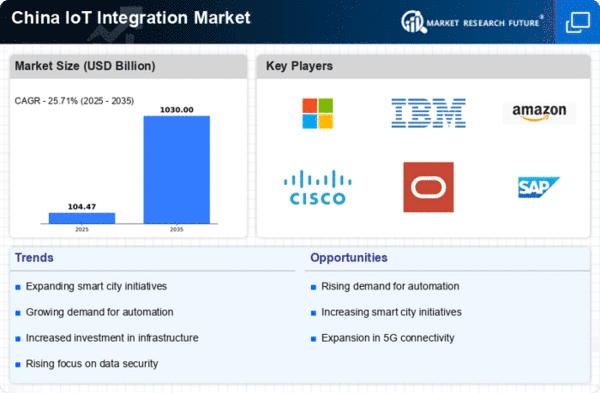Rising Demand for Automation
The iot integration market in China experiences a notable surge in demand for automation across various sectors. Industries such as manufacturing, agriculture, and logistics are increasingly adopting IoT solutions to enhance operational efficiency and reduce costs. According to recent data, the automation sector is projected to grow at a CAGR of approximately 20% over the next five years. This trend indicates a strong inclination towards integrating IoT technologies to streamline processes, improve productivity, and minimize human error. As businesses seek to remain competitive, the integration of IoT systems becomes essential, driving the growth of the iot integration market. Furthermore, the push for smart factories and connected supply chains further amplifies this demand, suggesting a robust future for automation-driven IoT solutions in China.
Increased Focus on Sustainability
Sustainability has emerged as a critical driver for the iot integration market in China, as businesses and consumers alike prioritize eco-friendly practices. The integration of IoT technologies facilitates better resource management, energy efficiency, and waste reduction, aligning with China's environmental goals. Recent studies indicate that companies implementing IoT solutions for sustainability report a reduction in operational costs by approximately 15%. This trend is particularly evident in sectors such as agriculture, where IoT applications optimize water usage and reduce chemical inputs. As the government enforces stricter environmental regulations, the demand for sustainable IoT solutions is likely to grow, further propelling the iot integration market. The emphasis on green technologies not only enhances corporate responsibility but also appeals to environmentally conscious consumers, creating a dual incentive for market growth.
Government Initiatives and Support
The Chinese government plays a pivotal role in fostering the growth of the iot integration market through various initiatives and policies. The 'Made in China 2025' strategy emphasizes the importance of advanced technologies, including IoT, in enhancing industrial capabilities. Financial incentives, grants, and subsidies are provided to companies investing in IoT integration, thereby stimulating market growth. Recent reports indicate that government funding for IoT projects has increased by over 30% in the past year, reflecting a strong commitment to technological advancement. This support not only encourages domestic innovation but also attracts foreign investment, further propelling the iot integration market. As the government continues to prioritize smart city initiatives and digital transformation, the integration of IoT technologies is likely to flourish, creating a conducive environment for market expansion.
Growing Consumer Awareness and Adoption
Consumer awareness regarding the benefits of IoT technologies is on the rise in China, significantly impacting the iot integration market. As individuals become more informed about smart home devices, wearable technology, and connected appliances, the demand for integrated IoT solutions increases. Recent surveys indicate that approximately 60% of Chinese consumers express interest in adopting smart technologies for their homes. This growing consumer base drives manufacturers to invest in IoT integration, enhancing product offerings and user experiences. Additionally, the proliferation of e-commerce platforms facilitates easier access to IoT devices, further accelerating adoption rates. As consumer preferences shift towards convenience and connectivity, the iot integration market is poised for substantial growth, reflecting a broader trend towards digital lifestyles in China.
Advancements in Connectivity Technologies
The evolution of connectivity technologies, such as 5G and LPWAN, significantly influences the iot integration market in China. These advancements enable faster data transmission, lower latency, and improved network reliability, which are crucial for the effective functioning of IoT devices. The rollout of 5G networks across major cities is expected to enhance the performance of IoT applications, particularly in sectors like transportation, healthcare, and smart cities. Industry analysts project that the adoption of 5G could increase the efficiency of IoT systems by up to 50%. This technological leap not only supports existing applications but also paves the way for innovative solutions, thereby driving the growth of the iot integration market. As connectivity improves, the potential for new use cases and applications expands, suggesting a dynamic future for IoT integration in China.
















